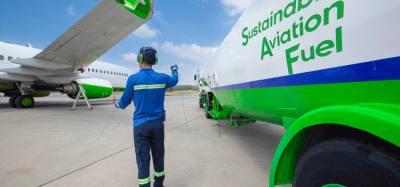Sustainability Series: Copenhagen Airport embarks on climate initiative
- Like
- Digg
- Del
- Tumblr
- VKontakte
- Buffer
- Love This
- Odnoklassniki
- Meneame
- Blogger
- Amazon
- Yahoo Mail
- Gmail
- AOL
- Newsvine
- HackerNews
- Evernote
- MySpace
- Mail.ru
- Viadeo
- Line
- Comments
- Yummly
- SMS
- Viber
- Telegram
- Subscribe
- Skype
- Facebook Messenger
- Kakao
- LiveJournal
- Yammer
- Edgar
- Fintel
- Mix
- Instapaper
- Copy Link
Posted: 31 May 2019 | International Airport Review | No comments yet
While 6.3 million passengers travel through Copenhagen Airport, the airport launches a new climate strategy and continues its expansion projects.


A record 2018 saw more than 30 million people travelling by air. During the first quarter of this year, 6,340,978 people travelled through Copenhagen Airport; 1.2 per cent more than in the same quarter last year.
It remains the long-haul, intercontinental routes that are witnessing the highest growth rates: 10.7 per cent more passengers travelled on routes outside Europe.
Thomas Woldbye, CEO of Copenhagen Airports A/S, explained: “Direct connections to some of the major growth markets in, say Asia, are important, especially for Denmark’s business community. In recent years, we have added many new routes to the CPH route map, including Hong Kong, Chengdu and Beijing in China and Delhi in India. The effect is also evident in the impressive increase in the number of passengers on these routes and the increase in transfer passengers.”
He also refers to the summer programme implemented by the airlines with the transition to daylight saving time.
“The new summer programme features 62 more routes than the winter programme, 23 of which are new. The new routes mean more travel options for Danes, while attracting more travellers to Denmark. This will be of particular benefit to the tourism industry in Denmark. It will simply make it easier for people in Southern Europe, for example, to travel here for holidays and pleasure.”
In the first quarter of the year, the number of local departing passengers was slightly less than the same period last year, while the number of transfer and transit passengers increased by 8.2 per cent, underpinning CPH’s position as a Northern European hub.
CPH’s revenue fell by 4.1 per cent compared to the same period in 2018, mainly due to the charges that came into force on 1 April 2018. The profit before tax was DKK 256.2 million, a decrease of 18.9 per cent compared to the same period in 2018.
Launch of new climate plan
In March, Copenhagen Airport launched its new climate strategy, which sets ambitious goals for the airport and airline traffic to be emission-free by 2030 and 2050 respectively.
Woldbye said: “The first step is our decision to make the airport CO2 neutral this year. We emit just under one kilogram of CO2 per passenger. We must reduce that figure to zero over the next decade. Until we reach that goal, we will compensate for each and every kilogram of CO2 by investing in projects that remove at least the same amount of CO2.
“We have entered into cooperation with the international NGO, Nexus for Development. In Laos, they manufacture and distribute efficient, health-friendly cookers to the local population. The project means that the reduction of CO2 emitted corresponds to the amount of our emissions.
“We have also launched a number of projects here at the airport, including more solar panel systems, new district heating stations and many other measures aimed at providing the green energy we need for running the airport in a 100 per cent climate-friendly way.”
Improved waste management also has high priority, and CPH focuses on reducing the use of plastic in the terminals. CPH also focuses on improving the recycling rate for waste from the daily operations of the airport and reusing as much material as possible in our construction projects.
One example is the collection of food waste from the restaurants and cafes in the shopping centre. This waste is used for production of biogas. Another example is the reuse of asphalt from runway maintenance for construction projects – avoiding the use of new gravel.
Biggest expansion in the airport’s history
In 2018, Copenhagen Airport invested approximately DKK two billion in expansions and improvements, a level expected to be maintained this year.
This summer will see the start of the brand new Finger E with gates particularly for long-haul aircraft, a new passport control and increased space for both passengers and staff.
Woldbye explains: “In addition to Finger E, we have taken the first steps towards expanding the airport after the security checkpoint between Gates B and C. Here, we are planning 80,000 m2 with more space for passengers, a larger baggage reclaim area and facilities for the numerous companies working inside the airport. This is the largest single expansion project in the history of the airport.”
Growth in non-aeronautical business
The non-aeronautical element of the business, including the shopping centre and parking facilities, grew as a result of the increase in the number of passengers. Revenue in the shopping centre increased by 7.5 per cent, which, in addition to the passenger growth, is mainly due to an increase in the number of restaurants and cafes with the completion of the Terminal 2 expansion.
Outlook
Traffic performance follows the expected traffic programme for 2018. CPH is, therefore, maintaining the expectations that were announced previously in relation to passenger numbers in 2018.
As in recent years, CPH expects to continue its high level of investment in 2019: A total of between DKK 1.8 and 2.1 billion.
Related topics
Aeronautical revenue, Regulation and Legislation, Sustainability, Sustainable development


















